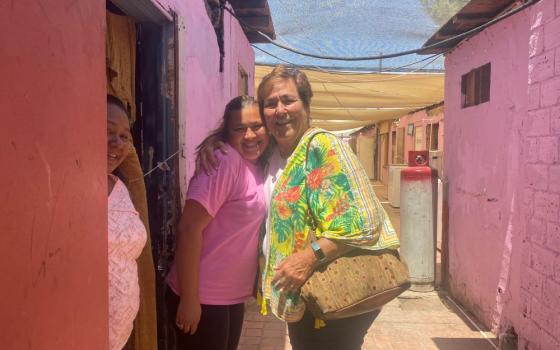
ATLANTA -- At its spring meeting in Atlanta, the U.S. Conference of Catholic Bishops overwhelmingly agreed to have its Committee on Domestic Justice and Human Development draft a special USCCB message, Catholic Reflections on Work, Poverty and a Broken Economy, for this fall.
"It is the committee's strong conviction that this effort is timely, if not overdue," said Bishop Stephen E. Blaire of Stockton, Calif., committee chairman, in the written proposal to draft such a message.
The reflections, forming a pastoral message about 12-15 pages long, are to be prepared for consideration and possible adoption by the entire body of bishops at their upcoming fall meeting in mid-November, shortly after this year's presidential election.
In presenting the proposal on the floor Wednesday, the first day of the Atlanta meeting, Blaire said the time has come for "a more extended response" by the bishops to the effects of the economy on people and to bring the message of the Gospel and church social teaching to those issues.
The message will not be a new program or policy letter, but rather, a source for study, reflection and discussion by Catholics in parish groups and other forums.
The proposal to draft the message was approved 171-26 on a written ballot, easily exceeding the required simple majority of bishops present and voting.
In the floor discussion before the vote, several bishops offered suggestions for tweaking a proposed outline of the message to highlight particular areas, such as the role of family life in a sound economy, the importance of the private sector in job creation and how the principle of subsidiarity should inform the document.
Retired Archbishop Joseph A. Fiorenza of Galveston-Houston, suggested that the message, while not a new pastoral letter on the economy, should "incorporate the basic principles of" the bishops' major 1986 pastoral letter on the subject, Economic Justice for All.
Blaire said the message would build on the pastoral while taking into account major economic changes since then and further church teachings, such as Pope Benedict's encyclicals Deus Caritas Est and Caritas in Veritate.
"This initiative is an effort to advance the USCCB's priority on human life and dignity and to demonstrate the New Evangelization in action," said the three-page written proposal, which the bishops received before the meeting.
Among other things, it said the message would seek to "lift up the human and family, moral and social, spiritual and community costs of current economic stress."
Two days before the bishops met, a US. Federal Reserve report concluded that in the Great Recession, the average American family lost 39 percent of its assets between 2007 and 2010, while the wealthy -- who in the years leading to the recession had profited greatly from major tax breaks, unregulated investments and a booming housing market artificially bloated by sub-prime mortgages -- slightly increased their assets in the same period.
The committee proposal said the message it planned to prepare would also:
- "Invite 'Catholic Conversations' on the moral dimensions and human impact of economic life and the ways to live out our faith in economic life, involving Catholic organizations and movements, colleges and universities, parishes and dioceses."
- "Seek to get beyond some of the ideological and partisan polarization on economic issues."
That latter effort, it said, would involve "recognizing that personal responsibility and public action, addressing family structure and economic structures, solidarity and subsidiarity are essential."
It also said the proposed message "would not be another major pastoral letter on the economy," like the bishops issued in 1986, or "an extended policy agenda."
"Rather, after the [2012 presidential] election, it would call on all of us, including public and economic leaders, to work together to advance the common good on work and poverty," it said.
Accompanying the proposal was a one-page outline, offered for the bishops' discussion, on how such a pastoral message might be structured in order to assess the signs of the times and the broken economy in light of Catholic teaching drawn from scripture, official Catholic social teaching and its underlying principles, and the church's experience in "a long tradition of thought and action."
Latter parts of the message, according to the outline, would include ways for Catholics at every level to engage in conversation about the issues, inviting them to assess ways to address those issues and develop effective action to overcome current partisan ideologies and begin again "to advance the common good and build a more just and productive economy."
In its background to the proposal, the committee linked it to the September 2011 meeting of the USCCB Administrative Committee, just two months before the bishops' national meeting in Baltimore in November, which urged bishops and pastors across the country "to focus public attention and priority on the scandal of so much poverty and so many without work in our society."
The background material said Blaire's committee at that time said it would come back with additional ways to respond to the bishops' concerns.
The move toward a more substantive response was reinforced at the bishops' November meeting, at which "several groups and bishops urged greater visibility and attention to the human and moral costs of the economic crisis," the committee said.
In addition, it said, when the Administrative Committee recently affirmed the review and renewal of the Catholic Campaign for Human Development, it specifically suggested "developing a pastoral message or other resources for education and discussion, prayer and reflection, action and advocacy" to address the nation's economic turmoil and increasing poverty.
This March, at its regular meeting that sets the agenda for the June general assembly, the Administrative Committee welcomed the Blaire committee's proposal and put it on the agenda in Atlanta.
[Jerry Filteau, NCR's Washington correspondent, is covering part of the USCCB meeting in Atlanta.]



